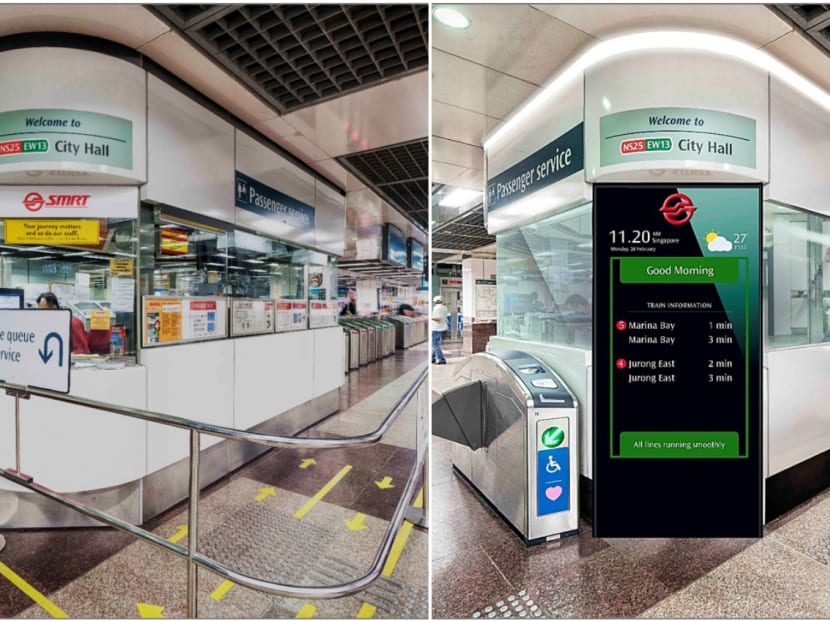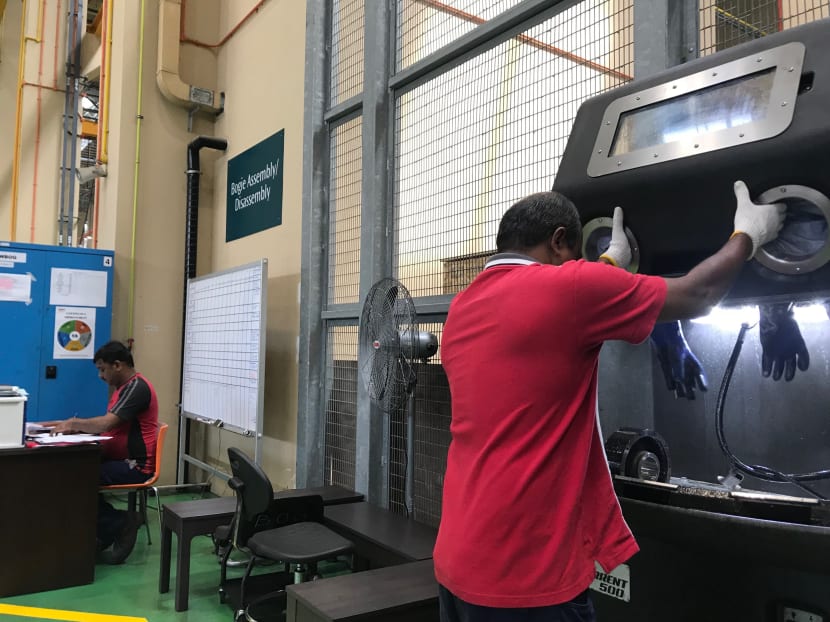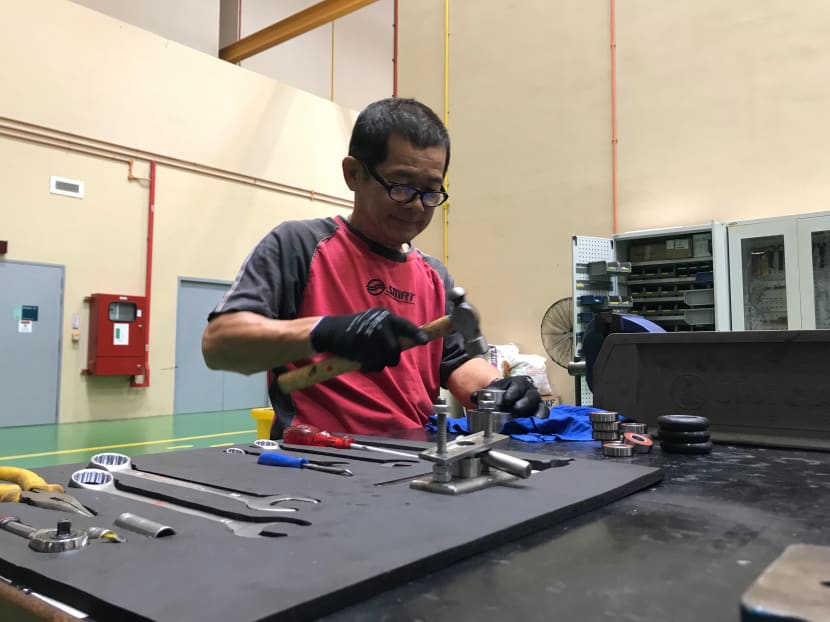Change for the better, Japanese-style, coming to your nearest MRT station
SINGAPORE — The human traffic jam experienced by commuters at MRT stations’ passenger service centres could be a thing of the past, as SMRT has begun redesigning these centres, beginning with City Hall MRT station.

An artist impression of the passenger service centre at City Hall MRT station before (left) and after (right) the implementation of Kaizen’s methodology. Photo: SMRT
SINGAPORE — The human traffic jam experienced by commuters at MRT stations’ passenger service centres could be a thing of the past, as SMRT has begun redesigning these centres, beginning with City Hall MRT station.
The queue lines, which are currently positioned beside the fare gates, will be relocated near the middle of the service centre so as not to disrupt the flow of commuters passing through.
Service counters will also be lowered to cater to children and commuters on wheelchairs. Full-height digital screens informing commuters about the latest train timings and service disruptions will replace the current signages and boards.
These improvements are among a series of initiatives the transport operator will be undertaking to improve commuter experience and staff productivity in the hopes of boosting rail reliability, which has taken a hit in recent months.
According to the annual Public Transport Customer Satisfaction Survey released on Feb 13, public satisfaction levels of MRT services dropped from 96 per cent to 91.8 per cent last year. The survey results found that the dip was largely due to commuters giving MRT services lower scores in the areas of reliability, waiting time, comfort, travel time, and service information.
The redesign of passenger services centres was influenced by the Japanese concept of Kaizen, which means “change for the better”, employed by the company’s management, engineers, and staff in the past month. The concept was also used to make changes to workflow processes at SMRT’s Tuas depot over the past month.
Employed by Japanese conglomerates like Toyota, it aims to make small improvements in an individual’s work flow which will lead to bigger gains in productivity and efficiency for the company on a macro-level.
SMRT chief corporate officer Gerard Koh said in a media briefing on Tuesday that overall workplace efficiency has improved since they adopted the concept, and the target is to make efficiency gains of 50 per cent over the next few years.
At SMRT’s newest depot at Tuas West, for example, a wash station used to clean the wheel components of a train has been relocated closer to the staff workbenches, reducing the time required to carry the components around.
Mr Aqeel Kaskhy, 27, an assistant engineer from the Wheelset Unit, said the repositioning of the wash stations saves him two to three minutes each time he has to clean a component and bring it back to his workbench. On average, Mr Aqeel makes about 10 trips to the wash station a day.
With 13 staff in the Wheelset unit, Mr Aqeel said this would translate to more than four hours saved each day.

“These small, individual improvements add up to big efficiency gains over time,” said Mr Koh.
On average, it takes about six days to strip and clean all the wheel components of one train. With the new initiatives, Mr Koh said the aim is to bring it down to about five, or five-and-a-half days.
When asked how improvements in workflow could impact rail reliability, Mr Koh added: “Potential faults can be addressed before they affect trains’ reliability and availability, avoiding time-consuming corrective maintenance and failures during operations.”
The Kaizen initiatives are also aimed at empowering workers to make suggestions for changes in workflow and processes.
At the Tuas depot’s Rolling Stock Workshop, daily sessions have been implemented for staff to surface problems and issues encountered at work to their respective team leaders.
Getting the buy-in from workers was a challenge, said Mr Koh, as some workers were initially doubtful that their suggestions would be heard.
It was a sentiment that Mr Aqeel echoed, as he said: “Previously there was some red tape for us to go through in order to see changes made.”
To address such problems, a four-member Kaizen expert team was embedded at the depot throughout the month-long pilot to note down suggestions, provide support to workers and “untie bureacratic knots”, said Mr Koh.
“Now, with the kaizen team, it is a lot easier for us to suggest improvements... generally we can see that improvements are being done,” said Mr Aqeel.
“We suggest they make the change and we can actually see the change quite quickly.”
Workstations have also been labelled with staff members’ names to encourage workers to be responsible, and take ownership of their work spaces.

Workstations have also been labelled with staff members’ names to encourage workers to take ownership of their work spaces. Photo: Cynthia Choo/TODAY
Asked if such changes will help resolve SMRT’s “deep-seated cultural issues” raised by chief executive officer Desmond Kuek last year, Mr Koh said that though the methods are not targeted at the “cultural problems”, employing Kaizen will help to improve the sense of accountability and ownership among its workers.
He added: “It is management efforts to say, ‘how can I support you to do your work better’, and improve the workflow, so that it is easier for (workers) to achieve what they are supposed to do.”
Following the pilot at Tuas West, the Kaizen initiatives will be rolled out progressively at other depots in Bishan, Ulu Pandan and Changi, said Mr Koh.






